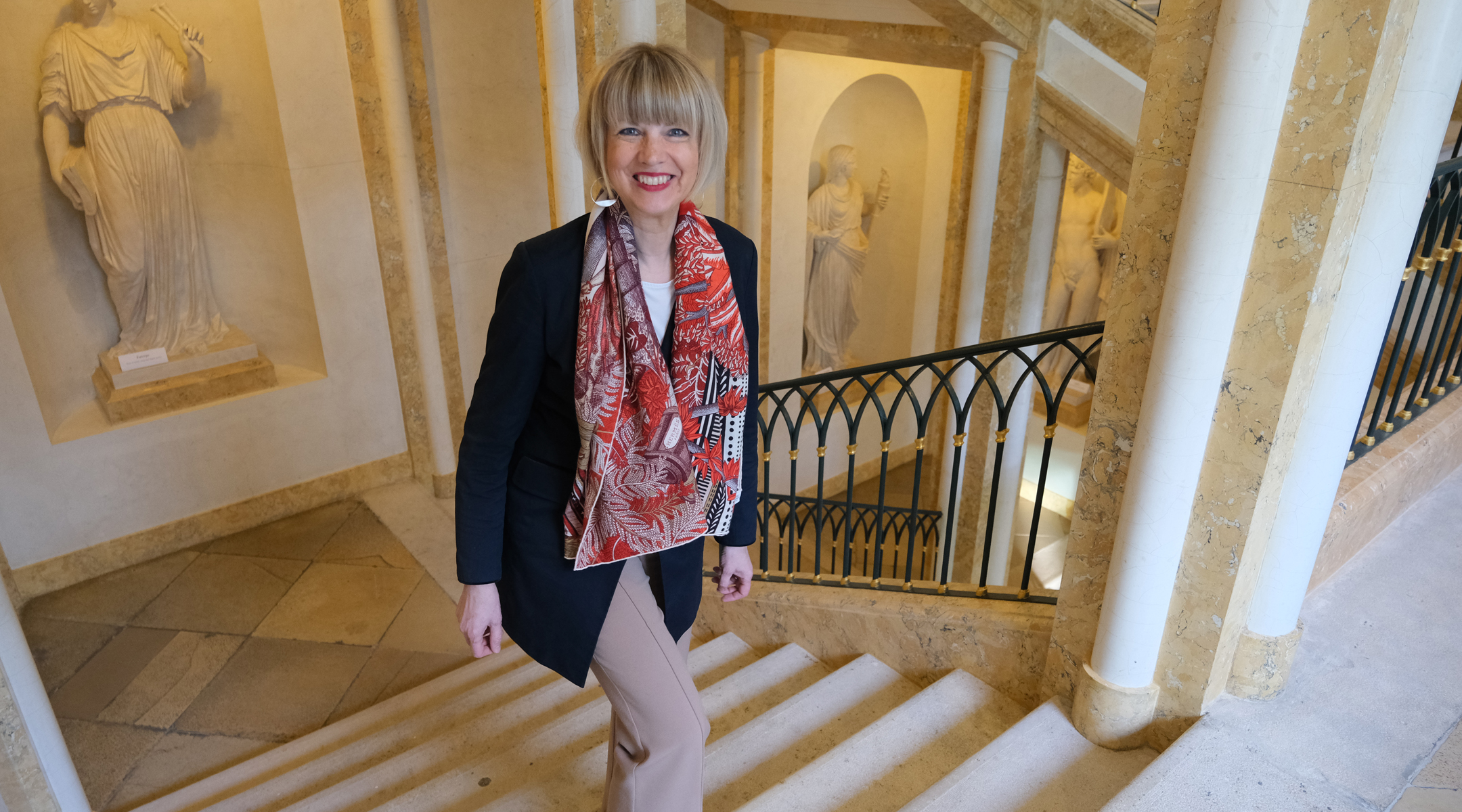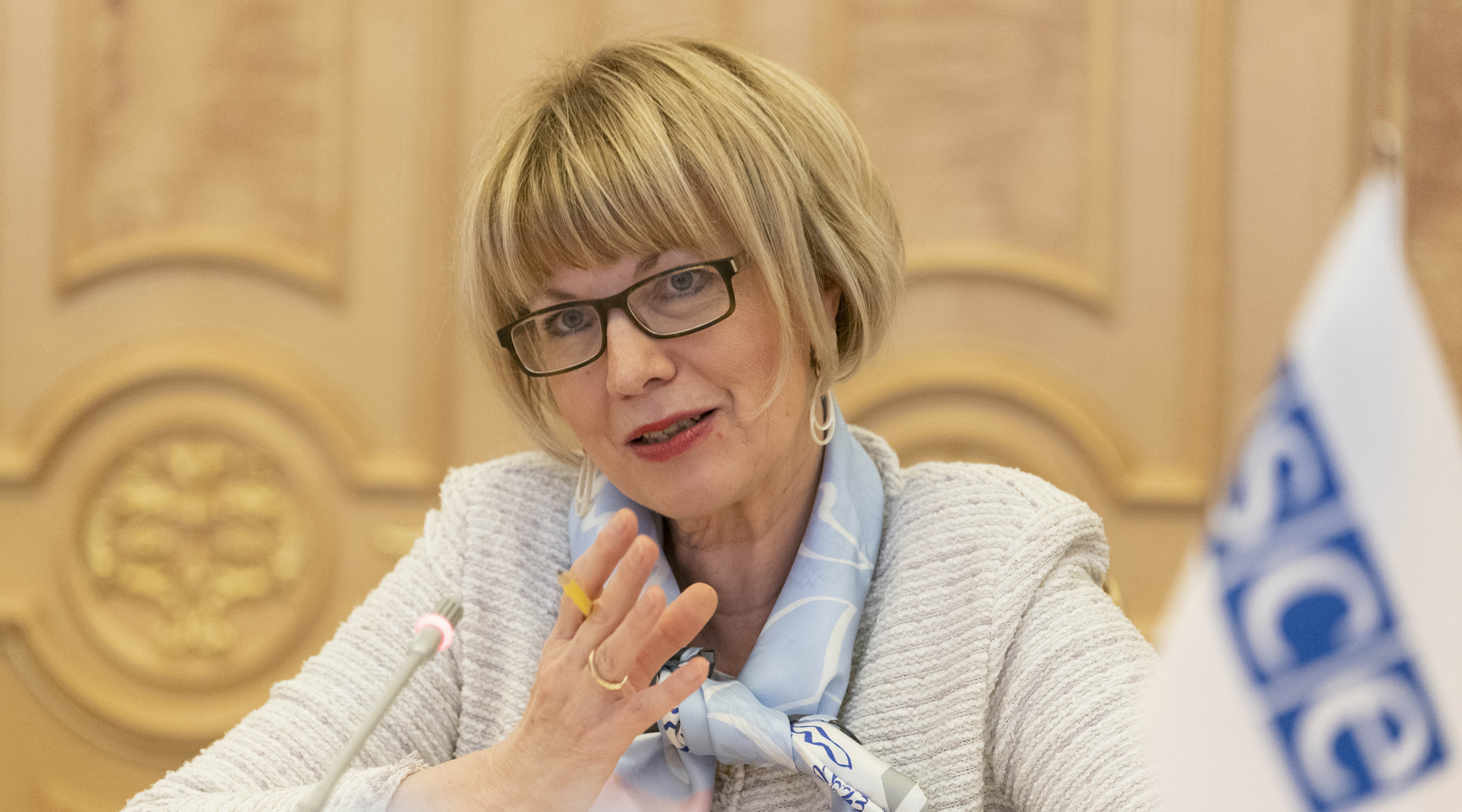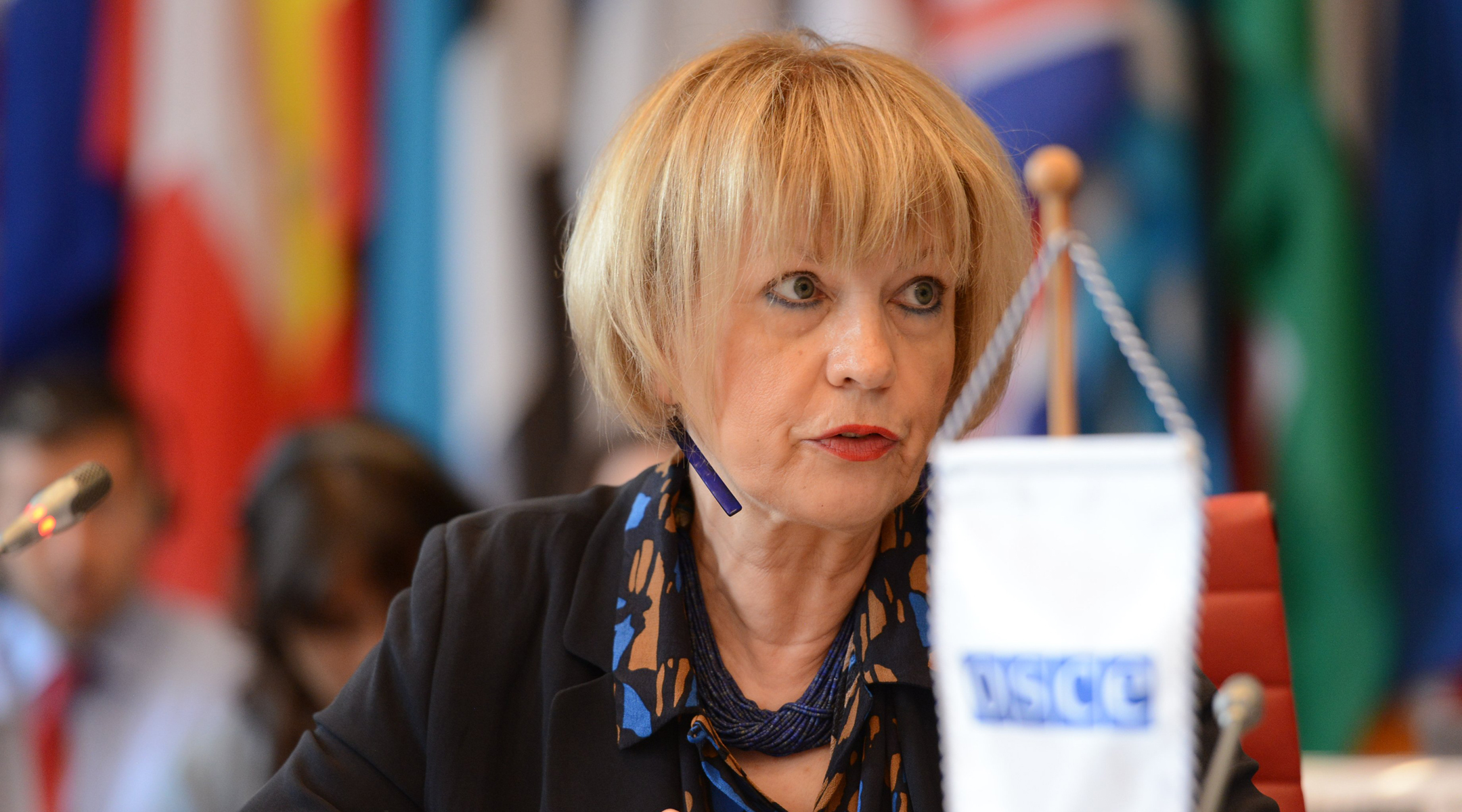Russia has achieved the closure of all OSCE’s field missions in Ukraine, abusing the principle of consensus that is governing in this organization. In preparation for the full-scale invasion, as early as last September, Moscow blocked the extension of the mandate of a small observer mission on the Ukrainian-Russian border, and with the start of the Great War, the work of the Special Monitoring Mission, deployed as a result of Russia’s hybrid aggression in 2014, was also paralyzed. Russia also blocked the renewal of the mandate of the Office of the OSCE Project Coordinator in Ukraine, which had worked in the country for 23 years. In response to Russia’s blocking of the OSCE’s work in Ukraine, a new Support Program for Ukraine was launched in November, which is not formally an OSCE field mission and is financed not from the Organization’s budget but by individual participating states.
In a written interview with Ukrinform, OSCE Secretary General Helga Maria Schmid revealed some details of the Program and gave an assessment of the current situation.

OSCE CONTINUES TO SUPPORT UKRAINE DESPITE RUSSIA'S POSITION
- Madam Secretary General, on November 1, the new donor-funded Support Programme for Ukraine (SPU) was launched by contributing OSCE participating States. How many countries have already volunteered to participate in the Program? What are the total costs of the Program's projects? How will the SPU be administered, will it have any project implementation office in Ukraine?
- We had to close down the OSCE Project Co-ordinator in Ukraine – a mission that began in the 1990s – because the OSCE rules require consensus on every mission’s mandate extension. The Russian Federation made clear that it was not going to support any OSCE mission in Ukraine. This is the same reason we had to close the Special Monitoring Mission. But the work we had been doing is still needed – and the desire among OSCE participating States to continue to support Ukraine is clear. That is why a number of them are contributing to this new donor-funded programme, which builds on the work that the OSCE has done in Ukraine over decades. And there was broad support for this when Ministers met in Łódź earlier this month for our annual Ministerial Council.
The team carrying out this work, which includes about 60 people, is based in Ukraine – in Kyiv. The Polish OSCE Chairpersonship appointed Ambassador Henrik Villadsen as Special Representative –Project Co-ordinator in Ukraine, who is to foster dialogue with relevant stakeholders in the country related to planning and co-ordinating of OSCE projects.
Projects are wide-ranging in theme and in scope, and include areas like addressing the environmental damage caused by the war, mine action, increasing capacity to provide social and psychological support to those affected by the war, supporting media freedom, countering cybercrime and combatting trafficking in human beings. What unites them is the focus on supporting Ukrainian institutions, civil society and people to deal with a variety of challenges the country is facing.
- One of the 23 projects of the Program will deal with increasing Ukraine's mine action capacity. What does this project look like - will it be training, supply of anti-mine equipment? What other important projects of the SPU could you highlight?
- We know that mine action is one of the key priorities for the Ukrainian government, so the team is working to ensure that the project is able to respond appropriately to the challenge. The scope of the problem is significant, and ensuring that areas affected by the war are safe for communities can be a costly and time-consuming exercise. But that only makes this more urgent, and we are working closely with Ukrainian authorities and others to ensure that we get this right.
Another highlight is how we are helping to enhance Ukraine’s chemical emergency response capacity, which is critical in peacetime but even more in the context of this war.

THERE CAN BE NO JUSTIFICATION FOR RUSSIAN ATTACKS AGAINST CITIES ACROSS UKRAINE
- Russia’s stepped-up missile strikes against Ukraine's critical infrastructure threaten millions of people with the prospect of a desolate winter without basic services. Does the OSCE plan to participate practically in overcoming the consequences of these attacks and strengthening the stability of Ukraine?
- I am appalled by the attacks against civilian infrastructure and cities across Ukraine. There can be absolutely no justification for such acts, which continue to put millions of Ukrainians at risk.
These attacks, which impair basic services - water, electricity and heating – place a tremendous burden on the government and population alike, especially as winter is setting in.
We are committed to supporting Ukraine and its people and are in constant contact with our partners on the ground to examine how we can ramp up and co-ordinate our efforts in this vein. I emphasized this point again last week at the International Conference on Ukraine’s Civilian Resilience that raised over 1 billion Euros to further support Ukraine and its people. This support is vital and I am so proud that the OSCE can play its part.
- The SPU is launched given the closure of the OSCE field missions in Ukraine after Russia blocked the extension of the mandate of the SMM and the Office of the Project Coordinator in Ukraine. At the same time, it will be implemented without the participation of the Russian Federation. Could we consider the launch of this Program as the response of the OSCE participating countries to Russia's blocking of the Organization's work in Ukraine?
- Participating States are showing their support to Ukraine in many ways – including through the new Support Programme. When our Ministers met in Poland at the beginning of December they made clear that support like this would continue. As I outlined earlier, it builds on the good work the OSCE had done and helps address the immense challenges that Ukraine and its citizens are facing.
SMM STAFF SHOULD BE RELEASED IMMEDIATELY
- Three national mission members of the OSCE Special Monitoring Mission to Ukraine (SMM) continue to be illegally detained in the Russian-occupied territory of eastern Ukraine. Isn’t it weird and contradictory when an OSCE participating state illegally detains OSCE mission employees and does not respond to calls from the Organization's leadership for their release? Perhaps the time has come for more radical measures to influence Moscow to release SMM staff.
- Securing the release of our staff members has been on the top of my agenda and that of our Polish Chair since we first learned of their detention.
Our message to all relevant stakeholders is clear – these three men should be released immediately and without any preconditions. This has been communicated countless times, both publicly and privately.
While most of our efforts take place ‘behind the scenes’, I can assure you that we are doing everything possible to support our colleagues. I am grateful to all who are supporting us in that effort.
We will continue to use every channel to make sure that they can return safely to their families.
WITH RUSSIA WAGING WAR AGAINST UKRAINE, REACHING CONSENSUS IS MORE CHALLENGING THAN EVER
- Do you see attempts by the Russian Federation to put pressure on the OSCE by abusing the rule of consensus and how ready is the Organization for such pressure? Russia used to blackmail the Council of Europe with non-payment of financial contributions. Don’t you see the risks of repeating a similar scenario concerning the OSCE?
- We are a consensus-driven organization, which means it only takes one participating State for a decision to be stopped. With 57 States bringing their different perspectives, agendas and ideas to the table, reaching consensus has not been an easy task even during the best of times and, unfortunately, there have been occasions in the past when our consensus principle has been misused.
Now, with Russia waging a war against Ukraine, reaching consensus is more challenging than ever. It is obvious that this has a real impact on the way our Organization operates on many different levels.
I have said it many times and want to highlight again that we have a shared responsibility. The OSCE is based on the understanding that participating States can get our support when implementing commitments and projects across the three dimensions of security – political-military, economic and environmental, and the human dimension.
Our task is to provide such support when it is requested. As Secretary General, I take this task very seriously.
This is why our new Support Programme for Ukraine is so important. I visited Kyiv in August with Polish Foreign Minister Rau - the OSCE 2022 Chairperson-in-Office - and stressed during my meetings with Minster Kuleba, high officials and civil society representatives, that the OSCE will remain engaged and committed to assisting the country.
And I can assure you that we we’ll keep working tirelessly to ensure that we can continue to deliver on the vital work across the OSCE region.

RUSSIA CHOSE TO LAUNCH WAR AGAINST UKRAINE DESPITE ALL OUR EFFORTS TO THE CONTRARY
- What lessons does Russia's current war of aggression against Ukraine teach the OSCE? Did you analyze within the Organization of how effectively the OSCE mechanisms for conflict prevention and response worked? And what can be done for the future?
- We are always looking for ways to improve our work, but I said it before and want to be clear that this war was not caused by the failure of OSCE’s tools for conflict prevention or any other international mechanism. We worked tirelessly in the lead up to 24 February. As tensions rose, I repeatedly raised my deep concerns about the military build-up at Ukraine’s borders in the OSCE Permanent Council. On 14 February, I provided formal early warning to OSCE Ambassadors noting the rising prospects of escalation and violence in the area. This was only the third time in history that this instrument was used. At the time, at the request of the Ukrainian authorities, our personnel remained in the country – both from the Project Co-ordinator’s team and the Special Monitoring Mission, which was still in place at the time – with 40 countries contributing.
However it was Russia that made the choice to launch a war of aggression against Ukraine, despite all our efforts to the contrary. As OSCE Chairman-in-Office Rau has made clear, no tools or formats can be effective when “one State is determined to destroy, not to build”.
This war is against all that we stand for – and all that we have worked for since we first came together during the Cold War – not as allies, but as States that didn’t see eye-to-eye, but were interested in finding ways to manage disagreement and build trust. For almost half a century, participating States have been working in co-operation to do exactly that - help mitigate risk, build confidence, improve security, and reduce the potential for conflict.
We have done this through mechanisms to exchange information about military manoeuvers and enable observation, through our field presence, and so much more – all in the interest of reducing the potential for conflict. And we are present on the local level in many countries which often helps to reduce tensions at the outset. This is the work we will continue – including in support of Ukraine with an entirely new way of engagement, in support of Moldova, of countries in Central Asia, South-eastern Europe, and across the OSCE region.
Vasyl Korotkyi, VIENNA
Photo: OSCE
